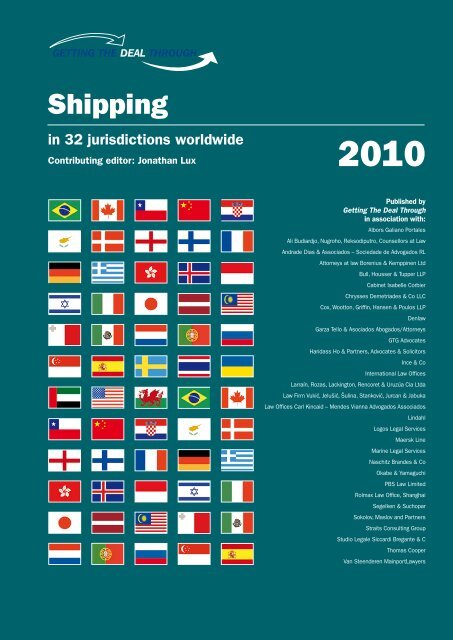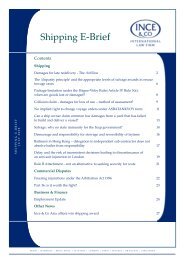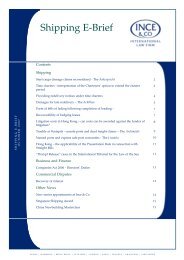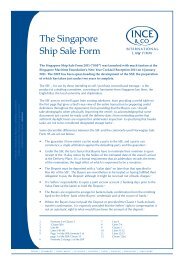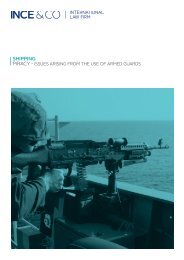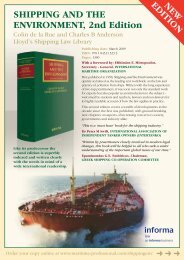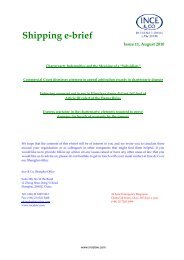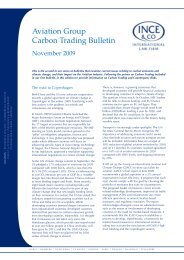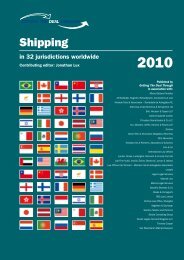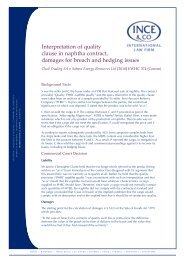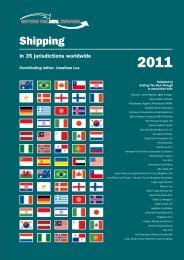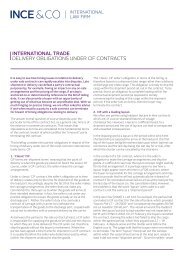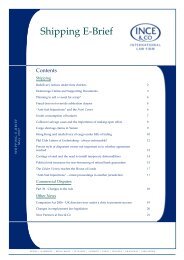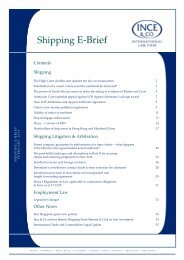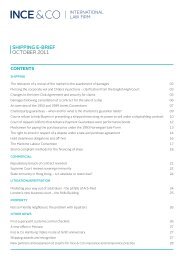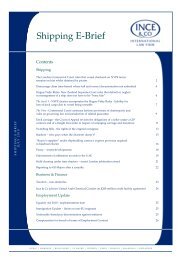Getting the Deal Through - Ince & Co
Getting the Deal Through - Ince & Co
Getting the Deal Through - Ince & Co
You also want an ePaper? Increase the reach of your titles
YUMPU automatically turns print PDFs into web optimized ePapers that Google loves.
®<br />
Shipping<br />
in 32 jurisdictions worldwide<br />
<strong>Co</strong>ntributing editor: Jonathan Lux 2010<br />
Published by<br />
<strong>Getting</strong> The <strong>Deal</strong> <strong>Through</strong><br />
in association with:<br />
Albors Galiano Portales<br />
Ali Budiardjo, Nugroho, Reksodiputro, <strong>Co</strong>unsellors at Law<br />
Andrade Dias & Associados – Sociedade de Advogados RL<br />
Attorneys at law Borenius & Kemppinen Ltd<br />
Bull, Housser & Tupper LLP<br />
Cabinet Isabelle <strong>Co</strong>rbier<br />
Chrysses Demetriades & <strong>Co</strong> LLC<br />
<strong>Co</strong>x, Wootton, Griffin, Hansen & Poulos LLP<br />
Denlaw<br />
Garza Tello & Asociados Abogados/Attorneys<br />
GTG Advocates<br />
Haridass Ho & Partners, Advocates & Solicitors<br />
<strong>Ince</strong> & <strong>Co</strong><br />
International Law Offices<br />
Larraín, Rozas, Lackington, Rencoret & Uruzúa Cia Ltda<br />
Law Firm Vukić, Jelušić, Šulina, Stanković, Jurcan & Jabuka<br />
Law Offices Carl Kincaid – Mendes Vianna Advogados Associados<br />
Lindahl<br />
Logos Legal Services<br />
Maersk Line<br />
Marine Legal Services<br />
Naschitz Brandes & <strong>Co</strong><br />
Okabe & Yamaguchi<br />
PBS Law Limited<br />
Rolmax Law Office, Shanghai<br />
Segelken & Suchopar<br />
Sokolov, Maslov and Partners<br />
Straits <strong>Co</strong>nsulting Group<br />
Studio Legale Siccardi Bregante & C<br />
Thomas <strong>Co</strong>oper<br />
Van Steenderen MainportLawyers
contents<br />
®<br />
Shipping 2010<br />
<strong>Co</strong>ntributing editor:<br />
Jonathan Lux<br />
<strong>Ince</strong> & <strong>Co</strong><br />
Business development manager<br />
Joseph Samuel<br />
Marketing managers<br />
Alan Lee<br />
Dan Brennan<br />
George Ingledew<br />
Edward Perugia<br />
Robyn He<strong>the</strong>rington<br />
Dan White<br />
Tamzin Mahmoud<br />
Ellie Notley<br />
Subscriptions manager<br />
Nadine Radcliffe<br />
Subscriptions@<br />
<strong>Getting</strong>The<strong>Deal</strong><strong>Through</strong>.com<br />
Assistant editor<br />
Adam Myers<br />
Editorial assistant<br />
Nick Drummond-Roe<br />
Senior production editor<br />
Jonathan <strong>Co</strong>wie<br />
Chief subeditor<br />
Jonathan Allen<br />
Senior subeditor<br />
Kathryn Smuland<br />
Subeditors<br />
Ariana Frampton<br />
Charlotte Stretch<br />
Editor-in-chief<br />
Callum Campbell<br />
Publisher<br />
Richard Davey<br />
Shipping 2010<br />
Published by<br />
Law Business Research Ltd<br />
87 Lancaster Road<br />
London, W11 1QQ, UK<br />
Tel: +44 20 7908 1188<br />
Fax: +44 20 7229 6910<br />
© Law Business Research Ltd<br />
2009<br />
No photocopying: copyright<br />
licences do not apply.<br />
ISSN 1759-0744<br />
The information provided in this<br />
publication is general and may not<br />
apply in a specific situation. Legal<br />
advice should always be sought before<br />
taking any legal action based on <strong>the</strong><br />
information provided. This information<br />
is not intended to create, nor does<br />
receipt of it constitute, a lawyer–client<br />
relationship. The publishers and<br />
authors accept no responsibility for<br />
any acts or omissions contained<br />
herein. Although <strong>the</strong> information<br />
provided is accurate as of September<br />
2009, be advised that this is a<br />
developing area.<br />
Printed and distributed by<br />
Encompass Print Solutions<br />
Tel: 0870 897 3239<br />
Introduction Martin A Clausen Maersk Line 3<br />
Brazil Godofredo Mendes Vianna Law Offices Carl Kincaid – Mendes Vianna Advogados Associados 4<br />
Canada John W Bromley and Michael J Posnikoff Bull, Housser & Tupper LLP 12<br />
Chile Ricardo Rozas Larraín, Rozas, Lackington, Rencoret & Uruzúa Cia Ltda 18<br />
China Lu Min and Margot Luo Rolmax Law Office, Shanghai 27<br />
Croatia Gordan Stanković and Maja Dotlić<br />
Law Firm Vukić, Jelušić, Šulina, Stanković, Jurcan & Jabuka 33<br />
Cyprus Michael McBride, Yiannis Christodoulou and Michael Papadopoulos<br />
Chrysses Demetriades & <strong>Co</strong> LLC 39<br />
Denmark Peter Schaumburg-Müller and Mathias Steinø Denlaw 45<br />
England & Wales Jonathan Lux with Reema Shour, Anna Fomina and Jams Rustambekov<br />
<strong>Ince</strong> & <strong>Co</strong> 51<br />
Finland Jan Aminoff and Inkeri Kuuskoski Attorneys at law Borenius & Kemppinen Ltd 60<br />
France Isabelle <strong>Co</strong>rbier Cabinet Isabelle <strong>Co</strong>rbier 66<br />
Germany Kathrin Janka Riehmer Segelken & Suchopar 72<br />
Greece Douglas Bateson and Ioanna Vitta Thomas <strong>Co</strong>oper 78<br />
Hong Kong Max Cross and Angela Yap <strong>Ince</strong> & <strong>Co</strong> 83<br />
Iceland Einar Baldvin Axelsson Logos Legal Services 92<br />
Indonesia M Husseyn Umar, Efendi H Manurung and Sahat A M Siahaan<br />
Ali Budiardjo, Nugroho, Reksodiputro, <strong>Co</strong>unsellors at Law 99<br />
Israel Peter Gad Nashitz Naschitz Brandes & <strong>Co</strong> 104<br />
Italy Francesco Siccardi, Francesca Ronco and Enrica Monzani<br />
Studio Legale Siccardi Bregante & C 108<br />
Japan Shuji Yamaguchi Okabe & Yamaguchi 117<br />
Latvia Edward Kuznetsov, Julia Kazmina and Diana Kalvane Marine Legal Services 122<br />
Malaysia Primila Edward Straits <strong>Co</strong>nsulting Group 127<br />
Malta Robert Tufigno and Cynthia van der Weerden GTG Advocates 132<br />
Mexico Fernando Escamilla and Anais Vivanco Garza Tello & Asociados Abogados/Attorneys 141<br />
Ne<strong>the</strong>rlands Arnold J van Steenderen, Marieke G van den Dool and Jasper R Groen<br />
Van Steenderen MainportLawyers 147<br />
Portugal Mateus Andrade Dias Andrade Dias & Associados – Sociedade de Advogados RL 156<br />
Russia Mikhail Sokolov, Anna Arkhipova and Sergey Seliverstov Sokolov, Maslov and Partners 166<br />
Singapore Ajaib Haridass, V Hariharan and Eddy Teng<br />
Haridass Ho & Partners, Advocates & Solicitors 172<br />
Spain Eduardo Albors, Javier Portales and Alfonso de Ochoa Albors Galiano Portales 180<br />
Sweden Erik Linnarsson, Peter Bäverlid, Mark Hallquisth and Christoffer Gramming Lindahl 189<br />
Thailand Paiboon Sutuntivorakoon and Dennie Soong PBS Law Limited 196<br />
Ukraine Arthur Nitsevych and Nikolay Melnykov International Law Offices 203<br />
United Arab Emirates Bob Deering, Brian Boahene, Pavlo Samothrakis, Khalid Hamed,<br />
Mona Al Sayegh, Alexandra Bailey and Jacqueline McFadden <strong>Ince</strong> & <strong>Co</strong> 208<br />
United States Gregory W Poulos and Rupert P Hansen<br />
<strong>Co</strong>x, Wootton, Griffin, Hansen & Poulos LLP 214<br />
Law<br />
Business<br />
Research<br />
www.getting<strong>the</strong>dealthrough.com
<strong>Ince</strong> & <strong>Co</strong><br />
England & Wales<br />
England & Wales<br />
Jonathan Lux with Reema Shour, Anna Fomina and Jams Rustambekov<br />
<strong>Ince</strong> & <strong>Co</strong><br />
Newbuilding contracts<br />
1 When does title in <strong>the</strong> ship pass from <strong>the</strong> shipbuilder to <strong>the</strong><br />
shipowner? Can <strong>the</strong> parties agree to change when title will pass?<br />
The shipbuilding contract will contain detailed provisions dealing<br />
with when title in <strong>the</strong> ship will pass. The parties are, in principle,<br />
free to agree whatever <strong>the</strong>y like. However, title normally passes on<br />
delivery. In most shipbuilding contracts payment is by instalments<br />
and payment of <strong>the</strong> final instalment and delivery are simultaneous.<br />
This is often marked by a formal closing meeting.<br />
It sometimes happens that, for whatever reason, <strong>the</strong> shipbuilder<br />
is not able to provide a refund guarantee (to secure <strong>the</strong> return of any<br />
pre-delivery instalments in <strong>the</strong> event of non-delivery). In such cases<br />
<strong>the</strong> contract might provide for <strong>the</strong> progressive transfer of title as <strong>the</strong><br />
construction progresses.<br />
2 What formalities need to be complied with for <strong>the</strong> refund guarantee to<br />
be valid?<br />
Under section 4 of <strong>the</strong> Statute of Frauds 1677, a contract of guarantee<br />
is unenforceable unless it is made in writing or is evidenced in a<br />
written note or memorandum. The agreement itself, or <strong>the</strong> note or<br />
memorandum of it must be signed by <strong>the</strong> party to be charged or by<br />
its agent. The note or memorandum must acknowledge <strong>the</strong> existence<br />
of <strong>the</strong> agreement and include <strong>the</strong> material terms of that agreement.<br />
It cannot be expressed to be ‘subject to contract’. There have been<br />
some interesting decisions on refund guarantees in <strong>the</strong> English courts<br />
in <strong>the</strong> past 12 months.<br />
3 Are <strong>the</strong>re any remedies available in local courts to compel delivery of<br />
<strong>the</strong> vessel when <strong>the</strong> yard refuses to do so?<br />
An order for specific performance of a contract is a discretionary<br />
remedy. Such an order is not normally granted if compliance with it<br />
would require detailed judicial supervision. Thus an order for specific<br />
performance of a shipbuilding contract compelling <strong>the</strong> builder<br />
to complete and deliver <strong>the</strong> vessel is unlikely to be granted. The<br />
situation may well be different where <strong>the</strong> vessel is complete and it is<br />
possible for <strong>the</strong> yard to deliver it.<br />
4 Where <strong>the</strong> vessel is defective and damage results, would a claim lie<br />
in product liability against <strong>the</strong> shipbuilder at <strong>the</strong> suit of <strong>the</strong> shipowner;<br />
a purchaser from <strong>the</strong> original shipowner; or a third party that has<br />
sustained damage?<br />
The <strong>Co</strong>nsumer Protection Act 1987 imposes a measure of strict<br />
liability for damage caused by a defective product. The person liable<br />
is <strong>the</strong> ‘producer’ of <strong>the</strong> product, and since <strong>the</strong> definition of product<br />
in <strong>the</strong> Act expressly includes ‘ship’ <strong>the</strong> possibility arises, in <strong>the</strong>ory<br />
at any rate, of anyone being able to make a claim against <strong>the</strong> shipbuilder<br />
under <strong>the</strong> Act. However, damage to <strong>the</strong> product itself is<br />
expressly excluded under <strong>the</strong> Act. Similarly, so far as concerns loss<br />
of or damage to property, <strong>the</strong> Act only applies in respect of damage<br />
to property ordinarily intended for <strong>the</strong> private use or consumption<br />
of <strong>the</strong> person who suffers <strong>the</strong> damage. In short, <strong>the</strong>refore, <strong>the</strong> Act<br />
will not apply to loss of or damage to commercial property, for<br />
example to cargo on <strong>the</strong> ship or to o<strong>the</strong>r vessels. In recent years,<br />
however, <strong>the</strong>re has been a marked increase in <strong>the</strong> construction of<br />
super- or mega-yachts for private use, and damage to such vessels,<br />
for example as a result of a collision with a defective vessel, might<br />
well come within <strong>the</strong> ambit of <strong>the</strong> Act. Where <strong>the</strong> Act does not<br />
apply, any remedy will depend upon <strong>the</strong> application of standard<br />
principles of contract and tort.<br />
Where <strong>the</strong> vessel is defective because of defects in workmanship<br />
or materials <strong>the</strong> shipbuilder will, subject to <strong>the</strong> terms of <strong>the</strong> contract,<br />
be in breach of contract and liable for any loss or damage sustained<br />
as a result. Shipbuilding contracts normally contain clauses that set<br />
specific time limits by which claims can be made. They may also<br />
contain terms seeking to limit or exclude liability on grounds o<strong>the</strong>r<br />
than time. However, in England and Wales <strong>the</strong>re are in place statutory<br />
provisions which, where applicable, impact on a contracting<br />
party’s freedom in this regard. Where <strong>the</strong> Unfair <strong>Co</strong>ntract Terms<br />
Act 1977 applies, liability for death or personal injury cannot be<br />
excluded.<br />
Depending upon <strong>the</strong> specific terms of <strong>the</strong> contract it may be<br />
that a purchaser from <strong>the</strong> original shipowner, or o<strong>the</strong>r third party,<br />
will be able to rely upon <strong>the</strong> <strong>Co</strong>ntracts (Rights of Third Parties) Act<br />
1999 to bring a claim against <strong>the</strong> shipbuilder. However, commercial<br />
contracts usually contain an express clause excluding <strong>the</strong> operation<br />
of that Act. Normally, <strong>the</strong>refore, both a purchaser from <strong>the</strong> original<br />
shipowner and a third party will be in <strong>the</strong> same position as against<br />
<strong>the</strong> shipbuilder. Nei<strong>the</strong>r will be entitled to rely on, or will be affected<br />
by, <strong>the</strong> terms of <strong>the</strong> original ship building contract.<br />
Never<strong>the</strong>less a claim will lie at <strong>the</strong> suit of a third party if he can<br />
demonstrate a negligent breach by <strong>the</strong> shipbuilder of a duty of care<br />
under <strong>the</strong> principles established in Donoghue v Stevenson [1932]<br />
AC 562.<br />
Ship registration and mortgages<br />
5 What vessels are eligible for registration under <strong>the</strong> flag of your<br />
country?<br />
Vessels eligible for registration in <strong>the</strong> Register of British Ships mirror<br />
<strong>the</strong> four parts of <strong>the</strong> Register:<br />
• part I – British ships which are not fishing vessels or small<br />
ships;<br />
• part II – fishing vessels;<br />
• part III – small ships under 24 metres in length; and<br />
• part IV – bareboat charter ships.<br />
Vessels operated by <strong>the</strong> Royal Navy are not able to register on <strong>the</strong><br />
British Ship Register but Royal Fleet Auxiliary vessels are permitted<br />
www.getting<strong>the</strong>dealthrough.com 51
England & Wales<br />
<strong>Ince</strong> & <strong>Co</strong><br />
to register. Royal yachts have been known to register on <strong>the</strong> British<br />
Registry in <strong>the</strong> past but in order to do so <strong>the</strong>y are still required to<br />
submit all documentation required for registration in <strong>the</strong> same way<br />
as any privately owned vessel coming to <strong>the</strong> flag.<br />
The Merchant Shipping Act 1995 (MSA 1995) provides that to<br />
be a British ship, <strong>the</strong> legal and beneficial owners of every share of<br />
a ‘majority interest’ (ie, 33 shares) in <strong>the</strong> vessel must be companies<br />
or citizens of Britain, an EEA state, or a British territory. Each of<br />
<strong>the</strong> shares to be counted in <strong>the</strong> ‘majority interest’ must be wholly<br />
owned by such qualified people. In <strong>the</strong> MSA 1995 ‘ship’ is defined<br />
as any vessel used in navigation, but this is likely to be interpreted<br />
more widely to include units capable of movement at sea, whe<strong>the</strong>r<br />
self-propelled or not. The Department of Trade has indicated that it<br />
considers submersibles and jack-up rigs as ships able to be registered<br />
under <strong>the</strong> MSA 1995. The Registrar of Shipping and Seamen should<br />
be consulted if eligibility for registration is not clear.<br />
6 What are <strong>the</strong> requirements for company formation?<br />
A limited company can be incorporated in England and Wales for<br />
<strong>the</strong> purpose of registering a vessel on <strong>the</strong> Register. The basic requirements<br />
under <strong>the</strong> <strong>Co</strong>mpanies Act 2006, which comes into force fully<br />
on 1 October 2009, are:<br />
• Memorandum of association: from 1 October 2009, <strong>the</strong> Memorandum<br />
will simply state that <strong>the</strong> subscribers wish to form a<br />
company under <strong>the</strong> 2006 Act, have agreed to become members<br />
of <strong>the</strong> company and, where <strong>the</strong> company is to have share capital,<br />
to take at least one share each;<br />
• Articles of association: <strong>the</strong> internal arrangements of a company<br />
are governed by its articles of association. A company may adopt<br />
its own articles or adopt one of <strong>the</strong> model articles of association<br />
prescribed for companies by <strong>the</strong> secretary of state ei<strong>the</strong>r with or<br />
without modification. The relevant model articles applicable to<br />
<strong>the</strong> type of company in question will apply by default to a company<br />
incorporated on or after 1 October 2009 unless it chooses<br />
to vary or exclude those articles;<br />
• Shareholders: from 1 October 2009, a public limited company<br />
will no longer need to have a minimum of two shareholders.<br />
Whe<strong>the</strong>r <strong>the</strong> incorporated company is a public limited company<br />
or a private company limited by shares, only one shareholder is<br />
required, irrespective of that shareholder’s nationality or place<br />
of residence;<br />
• Directors: a private limited company may have only one director<br />
if permitted in its articles; a public limited company must<br />
have at least two. At least one director on formation must be a<br />
natural person but a director’s nationality or place of residence<br />
is irrelevant;<br />
• <strong>Co</strong>mpany secretary: a private limited company does not need to<br />
have a company secretary unless required to do so by its articles<br />
of association; a public limited company must have a formally<br />
qualified secretary; and<br />
• Filing: where formation of a company is taking place after 1<br />
October 2009, <strong>the</strong> memorandum of association and articles of<br />
association (and payment of <strong>the</strong> requisite fee) must be filed at<br />
<strong>Co</strong>mpanies’ House toge<strong>the</strong>r with Form IN01 (application for<br />
registration).<br />
7 Is dual registration and flagging out possible and what is <strong>the</strong><br />
procedure?<br />
The dual registry system allows a charterer, leasing a ship registered<br />
in one country, to benefit from <strong>the</strong> advantages offered by ano<strong>the</strong>r<br />
registry. It also allows <strong>the</strong> shipowner to maintain <strong>the</strong> original registration,<br />
which is merely suspended during <strong>the</strong> dual registration but<br />
regains its effectiveness upon termination of <strong>the</strong> charter.<br />
The United Kingdom only allows dual charter registration under<br />
a bareboat charter and only when vessels are bareboat chartering<br />
into <strong>the</strong> UK. The Merchant Shipping Act (MSA) 1995 and associated<br />
regulations do not recognise chartering out of a vessel with UK<br />
Primary Registration.<br />
Ships can be bareboat chartered into <strong>the</strong> United Kingdom Register<br />
from any o<strong>the</strong>r world registry provided that <strong>the</strong> eligibility requirements<br />
for both vessel and charterer are met. As with owned ships,<br />
a representative person or managing charterer must be appointed.<br />
Once <strong>the</strong> initial paperwork is submitted <strong>the</strong> chosen name and port<br />
will be confirmed and an official number issued. Once <strong>the</strong>se details<br />
have been marked on <strong>the</strong> ship, <strong>the</strong> certificate of registry will be<br />
issued and will last for five years or <strong>the</strong> duration of <strong>the</strong> bareboat<br />
charter agreement, whichever is <strong>the</strong> shorter.<br />
8 Who maintains <strong>the</strong> register of mortgages and what information does it<br />
contain?<br />
The Registrar General of Shipping and Seamen maintains <strong>the</strong> mortgage<br />
register of a part I registered ship. The Register contains:<br />
• type of mortgage;<br />
• date of creation;<br />
• date and time of registration;<br />
• name and address of <strong>the</strong> mortgagee;<br />
• number of shares mortgaged; and<br />
• where relevant, original principal amount secured.<br />
English law does not permit mortgages in favour of <strong>the</strong> bearer<br />
so <strong>the</strong> mortgagee must be named. The amount is secured and <strong>the</strong><br />
repayments are not recorded. If <strong>the</strong> mortgage is discharged, this is<br />
endorsed on <strong>the</strong> reverse side of <strong>the</strong> mortgage and registered.<br />
Limitation of liability<br />
9 What limitation regime applies? What claims can be limited? Which<br />
parties can limit <strong>the</strong>ir liability?<br />
The UK is party to <strong>the</strong> 1976 <strong>Co</strong>nvention on Limitation of Liability<br />
for Maritime Claims (<strong>the</strong> 1976 <strong>Co</strong>nvention) as amended by <strong>the</strong><br />
1996 Protocol. Under <strong>the</strong> 1976 <strong>Co</strong>nvention, <strong>the</strong> persons entitled<br />
to limit <strong>the</strong>ir liability include shipowners, charterers (including<br />
slot charterers, according to a recent decision of <strong>the</strong> English High<br />
<strong>Co</strong>urt), managers, operators and salvors as well as any person for<br />
whose act, neglect or default those parties are responsible, and <strong>the</strong><br />
insurers of <strong>the</strong> liability of any of those parties. The English courts<br />
have held that <strong>the</strong> 1976 <strong>Co</strong>nvention also entitles <strong>the</strong> charterers to<br />
limit for claims brought against <strong>the</strong>m by shipowners.<br />
The 1976 <strong>Co</strong>nvention applies in terms to seagoing ships, but <strong>the</strong><br />
implementing legislation in <strong>the</strong> MSA 1995 extends <strong>the</strong> right to limit<br />
to non-seagoing ships as well as to hovercraft. Section 191 of <strong>the</strong><br />
MSA 1995 also extends <strong>the</strong> right of limitation to harbour authorities,<br />
conservancy authorities, owners of docks and canals.<br />
The claims that can be limited are set out in <strong>the</strong> 1976 <strong>Co</strong>nvention.<br />
It should be noted that <strong>the</strong> UK excludes claims for ‘loss of life<br />
or personal injury’ suffered by passengers on seagoing ships from<br />
<strong>the</strong> list subject to limitation. All such claims are subject to <strong>the</strong> A<strong>the</strong>ns<br />
<strong>Co</strong>nvention.<br />
The UK maintains a reservation in respect of article 2(1)(d) of<br />
<strong>the</strong> 1976 <strong>Co</strong>nvention with <strong>the</strong> result that liability for <strong>the</strong> cost of<br />
wreck removal is unlimited. That said <strong>the</strong>re are arguments that it is<br />
still possible to limit liability in respect of <strong>the</strong> recourse claims relating<br />
to wreck removal expenses.<br />
10 What is <strong>the</strong> procedure for establishing limitation?<br />
Rule 61.11 of <strong>the</strong> Civil Procedure Rules stipulates that a limitation<br />
action must be started in <strong>the</strong> Admiralty <strong>Co</strong>urt by issuing a<br />
claim form. At least one defendant must be named in <strong>the</strong> claim form<br />
but o<strong>the</strong>r defendants may be described generically. If <strong>the</strong> action is<br />
52 <strong>Getting</strong> <strong>the</strong> <strong>Deal</strong> <strong>Through</strong> – Shipping 2010
<strong>Ince</strong> & <strong>Co</strong><br />
England & Wales<br />
successful and a limitation decree granted, <strong>the</strong> limiting party will<br />
be entitled to limit liability against any and all claims, subject to<br />
limitation. It is possible to invoke limitation of liability without<br />
setting up a fund when commencing an action. However, in some<br />
circumstances <strong>the</strong>re may be advantages to doing so, for example, to<br />
protect against later increases in <strong>the</strong> fund or to make use of <strong>the</strong> rights<br />
contained in article 13 of <strong>the</strong> 1976 <strong>Co</strong>nvention, principally freedom<br />
from ship arrest in states party to <strong>the</strong> <strong>Co</strong>nvention.<br />
Limitation may also be pleaded by way of defence. Success with<br />
that defence, however, will only establish <strong>the</strong> right to limit liability to<br />
<strong>the</strong> claimant in that particular action and not liability to any o<strong>the</strong>r<br />
claimant(s). It is not necessary to set up a limitation fund where<br />
limitation is pleaded by way of defence.<br />
The limits are calculated on <strong>the</strong> basis of a sliding scale depending<br />
on <strong>the</strong> size of <strong>the</strong> vessel’s tonnage.<br />
11 In what circumstances can <strong>the</strong> limit be broken?<br />
Article 4 of <strong>the</strong> 1976 <strong>Co</strong>nvention provides that a person shall not be<br />
entitled to limit his liability if it is proved that <strong>the</strong> loss resulted from<br />
his personal act or omission, committed with <strong>the</strong> intent to cause<br />
such loss, or recklessly and with knowledge that such loss would<br />
probably result. The cases demonstrate that it is extremely difficult<br />
to break this limit.<br />
Port state control<br />
12 Which body is <strong>the</strong> port state control agency? Under what authority<br />
does it operate?<br />
Modern port state control in <strong>the</strong> UK derives from <strong>the</strong> voluntary<br />
commitment of EU member states to <strong>the</strong> Memorandum of Understanding<br />
agreed in Paris in 1982 (<strong>the</strong> Paris MoU). This was given a<br />
legal framework by <strong>the</strong> EU <strong>Co</strong>uncil Directive on Port State <strong>Co</strong>ntrol<br />
(95/21/EC) which was implemented in <strong>the</strong> UK by <strong>the</strong> Merchant<br />
Shipping (Port State <strong>Co</strong>ntrol) Regulations 1995, Statutory Instrument<br />
1995 No. 3128, as subsequently amended in <strong>the</strong> light of<br />
amending <strong>Co</strong>uncil Directives.<br />
The Port State <strong>Co</strong>ntrol Agency in <strong>the</strong> UK is <strong>the</strong> Maritime &<br />
<strong>Co</strong>astguard Agency which is an executive agency of <strong>the</strong> Department<br />
of Transport. It was established in 1998 as a result of <strong>the</strong> Port State<br />
<strong>Co</strong>ntrol (Amendment) Regulations, Statutory Instrument 1998 No.<br />
1433, and <strong>the</strong> merger of <strong>the</strong> Marine Safety Agency and <strong>the</strong> <strong>Co</strong>astguard<br />
Agency.<br />
13 What sanctions may <strong>the</strong> port state control inspector impose?<br />
Under <strong>the</strong> Paris MoU a state is obliged to carry out an annual total<br />
number of inspections equivalent to at least 25 per cent of <strong>the</strong><br />
number of individual ships to which <strong>the</strong> Port State <strong>Co</strong>ntrol Regulations<br />
apply and which enter <strong>the</strong> ports of a state in a representative<br />
calendar year. The UK has set itself a target of 25 to 30 per cent.<br />
The selection of which vessels to inspect can be complex. Annex 1 of<br />
<strong>Co</strong>uncil Directive 95/21/EC (as amended) identifies those ships that<br />
are an overriding priority for inspection. These include:<br />
• ships that have been reported as having deficiencies that may<br />
prejudice safe navigation;<br />
• ships that have failed to comply with applicable regulations<br />
regarding <strong>the</strong> carriage of dangerous and polluting goods;<br />
• ships that have been <strong>the</strong> subject of reports or complaints from<br />
legitimately interested persons or bodies about shipboard living<br />
and working conditions;<br />
• ships that have been:<br />
• involved in collision, grounding or stranding on <strong>the</strong>ir way<br />
to <strong>the</strong> port;<br />
• accused of discharging harmful substances or effluents; or<br />
• have manoeuvred in an erratic or unsafe manner or o<strong>the</strong>rwise<br />
operated in such a manner as to pose a danger to<br />
persons, property or <strong>the</strong> environment; and<br />
• ships which have been suspended from <strong>the</strong>ir class for safety reasons<br />
in <strong>the</strong> course of <strong>the</strong> preceding six months.<br />
In addition to <strong>the</strong> above ‘overriding factors’, <strong>the</strong>re are various ‘target<br />
factors’ that set out a system fur<strong>the</strong>r prioritising inspection of<br />
ships.<br />
Usually inspections are unannounced. The port state control<br />
officer (PSCO) will examine, inter alia, <strong>the</strong> external condition of <strong>the</strong><br />
ship, all relevant certificates and documents which are required to be<br />
carried on board and where <strong>the</strong>re are ‘clear grounds’ for believing<br />
that <strong>the</strong> condition of a ship or its equipment or crew does not meet<br />
requirements, more detailed inspection may be undertaken.<br />
The following sanctions may be imposed:<br />
• an improvement notice, which requires that a particular defect<br />
is repaired within a stated period (section 261 of <strong>the</strong> MSA<br />
1995);<br />
• a prohibition notice, which requires that a particular activity<br />
cease (section 262 MSA 1995);<br />
• a detention notice, whereby <strong>the</strong> vessel is prevented from leaving<br />
port until <strong>the</strong> PSCO is satisfied that <strong>the</strong> deficiencies have been<br />
properly rectified and <strong>the</strong> detention notice has been lifted. The<br />
vessel is only permitted to be moved from <strong>the</strong> place of detention<br />
if <strong>the</strong> repairs cannot be made at that place, or if <strong>the</strong>re are overriding<br />
reasons of safety. Unauthorised departure from <strong>the</strong> port<br />
of detention may incur liability to a fine or imprisonment; or<br />
• an access refusal notice – this is a sanction available to a PSCO<br />
in relation to oil, gas and chemical tankers, bulk carriers, or<br />
passenger ships where <strong>the</strong> vessel is registered in a state that is on<br />
<strong>the</strong> blacklist in <strong>the</strong> annual Paris MoU report and <strong>the</strong> vessel has<br />
previously been detained as required in <strong>the</strong> Paris MoU. Once <strong>the</strong><br />
vessel has called at a port and been detained, <strong>the</strong> access refusal<br />
notice may be issued. This notice bans <strong>the</strong> vessel from <strong>the</strong> Paris<br />
MoU region.<br />
14 What is <strong>the</strong> appeal process against detention orders or fines?<br />
Regulations 10 to 12 of Statutory Instrument 1995 No. 3128, as<br />
amended, provide owners and masters with rights of appeal and<br />
compensation in respect of a detention notice or access refusal<br />
notice. An independent arbitrator decides <strong>the</strong> appeal. The notice of<br />
reference form must be sent to <strong>the</strong> PSCO within 21 days of receipt<br />
of <strong>the</strong> detention or access refusal notice. A notice of appeal should<br />
also be sent to <strong>the</strong> MCA office which issued <strong>the</strong> order. There is no<br />
requirement for <strong>the</strong> arbitrator to be a professional or a member of a<br />
particular arbitration association. The appeal can be stopped at any<br />
time. Detention will not be suspended by issuing a notice of reference,<br />
nor does <strong>the</strong> arbitrator have <strong>the</strong> power to suspend <strong>the</strong> detention.<br />
At arbitration, <strong>the</strong> burden of proof is on <strong>the</strong> owner who must<br />
show that <strong>the</strong> PSCO was wrong to conclude that <strong>the</strong> vessel should<br />
be detained. The arbitrator must <strong>the</strong>n decide whe<strong>the</strong>r <strong>the</strong> PSCO<br />
was justified in concluding that <strong>the</strong> vessel should be detained. The<br />
arbitrator may also order that <strong>the</strong> owner be compensated for any<br />
loss suffered as a result of <strong>the</strong> detention, including lost freight, port<br />
expenses and legal costs. Appeal against <strong>the</strong> arbitrator’s decision is<br />
only possible on a question of law or serious irregularity. A recent<br />
case appears to have been <strong>the</strong> first case for a century dealing with<br />
<strong>the</strong> legality of detention of a vessel under <strong>the</strong> UK merchant shipping<br />
legislation. In that case, <strong>the</strong> disponent owners of <strong>the</strong> cruise ship<br />
sought to challenge <strong>the</strong> validity of two notices of detention issued by<br />
<strong>the</strong> Maritime <strong>Co</strong>astguard Authority, but did not appeal <strong>the</strong> notices<br />
within <strong>the</strong> 21 day time period stipulated by <strong>the</strong> Regulations. The<br />
court, asked to decide a number of preliminary issues, held in this<br />
regard that some technical defects in <strong>the</strong> two notices of detention<br />
issued did not invalidate <strong>the</strong>m.<br />
www.getting<strong>the</strong>dealthrough.com 53
England & Wales<br />
<strong>Ince</strong> & <strong>Co</strong><br />
Classification societies<br />
15 Which are <strong>the</strong> approved classification societies?<br />
The list of classification societies approved by <strong>the</strong> UK government for<br />
<strong>the</strong> purpose of carrying out surveys prior to registration include:<br />
• <strong>the</strong> American Bureau of Shipping;<br />
• Bureau Veritas;<br />
• Class NK;<br />
• Det Norske Veritas;<br />
• Germanischer Lloyd;<br />
• Lloyd’s Register of Shipping;<br />
• Registro Italiano Navale;<br />
• <strong>the</strong> Royal Yachting Association and<br />
• <strong>the</strong> Yacht Brokers, Designers and Surveyors Association.<br />
The last two societies are approved only for pleasure crafts of up to<br />
24 metres in length.<br />
16 In what circumstances can a classification society be held liable, if at<br />
all?<br />
Classification societies usually exclude <strong>the</strong>ir liability in contract.<br />
However, it is <strong>the</strong>oretically possible for a classification society to<br />
incur liability in tort if <strong>the</strong> claimant can establish that <strong>the</strong> classification<br />
society owed a duty of care, that that duty of care was breached<br />
and that such breach resulted in loss or damage to <strong>the</strong> claimant.<br />
Although <strong>the</strong> landmark decision of <strong>the</strong> House of Lords in Marc Rich<br />
& <strong>Co</strong> v Bishop Rock Marine (‘<strong>the</strong> Nicholas H’) [1995] 2 Lloyd’s<br />
Rep 299 established that classification societies do not owe a duty<br />
of care towards third parties in respect of <strong>the</strong>ir classification and<br />
certification duties, recent international developments concerning<br />
<strong>the</strong> liability of classification societies may lead <strong>the</strong> House of Lords<br />
to decide differently should a new case come before it.<br />
The International Association of Classification Societies (IACS),<br />
which has 10 full members and one associate member, has introduced<br />
a level of self-regulation among its members, including <strong>the</strong><br />
formation of uniform standards on technical safety rules. In addition,<br />
<strong>the</strong> Erika III package of maritime safety and anti-pollution<br />
reforms came into force on 29 July 2009 and includes a Regulation<br />
and a Directive on common rules and standards for ship inspection<br />
and survey organisations. The Directive must be enacted by <strong>the</strong> EU<br />
member states into national legislation by 17 June 2011. The Regulation<br />
is stated to be binding in its entirety and directly applicable<br />
in all member states. In summary, <strong>the</strong>se enactments provide for classification<br />
societies to achieve <strong>the</strong> status of ‘recognised organisations’<br />
on behalf of member states in certain circumstances, whereupon<br />
<strong>the</strong>y will be subject to <strong>the</strong> uniform rules and standards and minimum<br />
criteria laid down for such recognised organisations in <strong>the</strong>se<br />
instruments. The Directive also contains provisions concerning <strong>the</strong><br />
financial liability of recognised organisations in <strong>the</strong> case of a wilful<br />
act or omission or gross negligence.<br />
<strong>Co</strong>llision, salvage, wreck removal and pollution<br />
17 Can <strong>the</strong> state or local authority order wreck removal?<br />
Under <strong>the</strong> MSA 1995 a harbour or conservancy authority has <strong>the</strong><br />
power to remove, destroy, take possession of or mark a wreck<br />
where, in <strong>the</strong> opinion of <strong>the</strong> authority, <strong>the</strong> wreck is an obstruction<br />
or danger. The authority may sell <strong>the</strong> removed vessel and reimburse<br />
<strong>the</strong>ir expenses from <strong>the</strong> proceeds. The authority may contract with<br />
a third party for <strong>the</strong> removal or salvage of a wreck. Liability for<br />
<strong>the</strong> costs of wreck removal lies with <strong>the</strong> owner (as mentioned in<br />
question 9 above, such liability is unlimited), notwithstanding that<br />
a third party may be ultimately liable, for example, where <strong>the</strong>re has<br />
been a collision as a result of <strong>the</strong> negligence of ano<strong>the</strong>r vessel.<br />
Where <strong>the</strong>re is no harbour or conservancy authority with <strong>the</strong><br />
power to remove a wreck, <strong>the</strong> general lighthouse authority has <strong>the</strong><br />
same powers to remove a wreck in its area.<br />
18 Which international conventions or protocols are in force in relation to<br />
collision, salvage and pollution?<br />
The <strong>Co</strong>llision <strong>Co</strong>nvention 1910 was implemented in national legislation<br />
by <strong>the</strong> Maritime <strong>Co</strong>nventions Act 1911 which was repealed<br />
and replaced by <strong>the</strong> MSA 1995. The <strong>Co</strong>llision Regulations 1972<br />
are in force subject to <strong>the</strong> MSA 1995 and apply to all British ships<br />
wherever <strong>the</strong>y may be and to all foreign ships within UK waters.<br />
The International <strong>Co</strong>nvention on Salvage 1989 applies to <strong>the</strong> UK.<br />
Also in force is <strong>the</strong> International <strong>Co</strong>nvention for <strong>the</strong> Prevention<br />
of Pollution from Ships 1973 as amended by <strong>the</strong> 1978 Protocol<br />
(Marpol 73/78) and subsequently amended by <strong>the</strong> 1997 Protocol.<br />
Fur<strong>the</strong>r, <strong>the</strong> International <strong>Co</strong>nvention on Civil Liability for Oil Pollution<br />
Damage 1992 (CLC 1992), <strong>the</strong> Fund <strong>Co</strong>nvention 1992 and<br />
<strong>the</strong> Supplementary Fund Protocol 2003 apply in <strong>the</strong> UK.<br />
The International <strong>Co</strong>nvention on Civil Liability for Bunker Oil<br />
Pollution Damage 2001, which entered into force on 21 November<br />
2008, has been ratified in this jurisdiction. This instrument aims to<br />
ensure that adequate, prompt and effective compensation is available<br />
to persons who suffer damage caused by spills of oil, when<br />
carried as fuel in vessels’ bunker tanks.<br />
19 Is <strong>the</strong>re a mandatory local form of salvage agreement or is Lloyd’s<br />
standard form of salvage agreement acceptable? Who may carry out<br />
salvage operations?<br />
There is no mandatory form of salvage agreement. Lloyd’s open<br />
form (LOF) is acceptable and indeed that is <strong>the</strong> most common form<br />
of salvage agreement. However, <strong>the</strong> LOF does not have to be used<br />
and parties can agree <strong>the</strong>ir own terms and conditions. Usually, salvage<br />
operations are undertaken by professional salvage contractors,<br />
but in fact anyone can carry out salvage operations and <strong>the</strong>n bring<br />
a claim for common law salvage.<br />
Ship arrest<br />
20 Which international convention regarding <strong>the</strong> arrest of ships is in force<br />
in your jurisdiction?<br />
The UK is a party to <strong>the</strong> <strong>Co</strong>nvention Relating to <strong>the</strong> Arrest of Seagoing<br />
Ships, Brussels, 1952, which is in broad terms applicable in<br />
<strong>the</strong> UK.<br />
21 In respect of what claims can a vessel be arrested? In what<br />
circumstances may associated ships be arrested?<br />
Section 20(2) of <strong>the</strong> Supreme <strong>Co</strong>urt Act 1981 lists 19 types of maritime<br />
claim within <strong>the</strong> admiralty jurisdiction of <strong>the</strong> High <strong>Co</strong>urt and<br />
in respect of which a vessel may be arrested. These include claims<br />
relating to <strong>the</strong> possession or ownership of, or mortgage on, a ship,<br />
claims for damage done by or to a ship, claims for loss of life or<br />
personal injury due to a defect in a ship, claims for loss of or damage<br />
to goods carried on a ship, o<strong>the</strong>r claims relating to <strong>the</strong> carriage of<br />
goods on a ship, claims relating to <strong>the</strong> use or hire of a ship, claims<br />
for salvage, towage and pilotage, claims for goods and materials<br />
supplied to a ship, claims in respect of <strong>the</strong> construction or repair<br />
of a ship, claims by <strong>the</strong> master or crew for wages, claims arising<br />
out of a general average act, and claims arising out of bottomry<br />
and collisions. Notable exceptions to this list, that is, where arrest<br />
is not possible, include claims for insurance premiums and claims<br />
for legal costs.<br />
English law treats both English and foreign flag vessels equally<br />
and it does not distinguish between ‘<strong>Co</strong>nvention’ and ‘non-<strong>Co</strong>nvention’<br />
vessels.<br />
54 <strong>Getting</strong> <strong>the</strong> <strong>Deal</strong> <strong>Through</strong> – Shipping 2010
<strong>Ince</strong> & <strong>Co</strong><br />
England & Wales<br />
It is possible to arrest sister ships but not associated ships. Sister<br />
ships are vessels that at <strong>the</strong> time when action is brought are owned<br />
by <strong>the</strong> same person who was <strong>the</strong> owner of <strong>the</strong> ship in connection<br />
with which <strong>the</strong> claim arises at <strong>the</strong> time when <strong>the</strong> cause of action<br />
arose.<br />
22 What is <strong>the</strong> test for wrongful arrest?<br />
A claim for wrongful arrest usually requires demonstration of bad<br />
faith or gross negligence.<br />
Whilst not strictly speaking cases of wrongful arrest, <strong>the</strong>re<br />
have been recent English court decisions where Senegalese cargo<br />
underwriters, through <strong>the</strong> Senegalese receivers, attempted to hold<br />
ship-owners and <strong>the</strong>ir P & I Club to ransom by arresting vessels in<br />
Senegal and insisting on a Senegalese law and jurisdiction clause in<br />
<strong>the</strong> bank letter of guarantee to govern <strong>the</strong> substantive cargo claims,<br />
where <strong>the</strong> bills of lading incorporated an English law and London<br />
arbitration agreement. The court held that <strong>the</strong> owners were entitled<br />
to damages from <strong>the</strong> time when <strong>the</strong> vessel could and should have<br />
been released with adequate security in place.<br />
23 Can a bunker supplier arrest a vessel in connection with a claim for<br />
<strong>the</strong> price of bunkers supplied to that vessel pursuant to a contract<br />
with <strong>the</strong> charterer, ra<strong>the</strong>r than with <strong>the</strong> owner, of that vessel?<br />
Under English law, a supplier can only proceed against <strong>the</strong> party<br />
with whom <strong>the</strong> bunker supplier has contracted and cannot arrest<br />
a vessel if it did not contract directly with <strong>the</strong> owner or demise<br />
charterer. Fur<strong>the</strong>rmore, even if <strong>the</strong> bunker supply contract with <strong>the</strong><br />
charterer contains an express term giving <strong>the</strong> supplier a lien on <strong>the</strong><br />
vessel under <strong>the</strong> law governing that contract, this would have no<br />
effect under English law because <strong>the</strong> owners are not party to that<br />
contract. The majority decision of <strong>the</strong> Privy <strong>Co</strong>uncil in ‘The Halcyon<br />
Isle’ [1980] 2 LLR 325 held that <strong>the</strong> lex fori alone governs <strong>the</strong><br />
recognition and ranking of foreign maritime liens under English law<br />
and this majority view has subsequently had considerable persuasive<br />
effect in cases decided in a number of jurisdictions.<br />
24 Will <strong>the</strong> arresting party have to provide security and in what form and<br />
amount?<br />
It is not necessary under English law for <strong>the</strong> arresting party to provide<br />
counter-security; however, an undertaking is required from <strong>the</strong><br />
arresting party to <strong>the</strong> admiralty marshal to pay all costs of arrest,<br />
care and custody upon demand of <strong>the</strong> admiralty marshal.<br />
25 Who is responsible for <strong>the</strong> maintenance of <strong>the</strong> vessel while it is under<br />
arrest?<br />
The costs of arrest, care and custody are reimbursed to <strong>the</strong> admiralty<br />
marshal by <strong>the</strong> arresting party, but <strong>the</strong> arresting party will be able to<br />
recover <strong>the</strong> costs from <strong>the</strong> defendant when <strong>the</strong> ship is sold because<br />
<strong>the</strong> admiralty marshal’s costs and expenses rank first in priority of<br />
claims against <strong>the</strong> proceeds of sale of <strong>the</strong> vessel.<br />
Carriage of goods by sea and bills of lading<br />
26 Are <strong>the</strong> Hague Rules, Hague-Visby Rules, Hamburg Rules or some<br />
variation in force and have <strong>the</strong>y been ratified or implemented without<br />
ratification? When does carriage at sea begin and end for <strong>the</strong><br />
purpose of application of such Rules? Is your state proposing to ratify,<br />
accept, approve or accede to <strong>the</strong> UN <strong>Co</strong>nvention on <strong>Co</strong>ntracts for <strong>the</strong><br />
International Carriage of Goods Wholly or Partly by Sea?<br />
force of law. Under article I(e) of <strong>the</strong> HVR, carriage by sea covers <strong>the</strong><br />
period from <strong>the</strong> time when <strong>the</strong> goods are loaded on board <strong>the</strong> ship to<br />
<strong>the</strong> time <strong>the</strong>y are discharged from <strong>the</strong> ship. However, as confirmed<br />
by <strong>the</strong> decision in Pyrene v Scindia Navigation [1954] 2 QB 402, <strong>the</strong><br />
parties are free to agree on <strong>the</strong> role each is to play in <strong>the</strong> loading and<br />
<strong>the</strong> extent to which loading and discharging are brought within <strong>the</strong><br />
carrier’s obligations is left to <strong>the</strong> parties <strong>the</strong>mselves to decide.<br />
The Department of Transport has set up a consultative working<br />
group to consider <strong>the</strong> impact of <strong>the</strong> UN <strong>Co</strong>nvention on <strong>Co</strong>ntracts<br />
for <strong>the</strong> International Carriage of Goods Wholly or Partly by Sea (<strong>the</strong><br />
Rotterdam Rules). At present, however, it is not clear if and when<br />
<strong>the</strong> UK will ratify <strong>the</strong> Rotterdam Rules.<br />
27 Are <strong>the</strong>re conventions or domestic laws in force in respect of road, rail<br />
or air transport that apply to stages of <strong>the</strong> transport o<strong>the</strong>r than by sea<br />
under a combined transport or multimodal bill of lading?<br />
The <strong>Co</strong>nvention on <strong>the</strong> International Carriage of Goods by Road<br />
1956 (CMR) has been implemented into English law by <strong>the</strong> Carriage<br />
of Goods by Road Act 1965. The provisions of <strong>the</strong> CMR will apply<br />
to <strong>the</strong> international road leg of a carriage that comes before or after<br />
ano<strong>the</strong>r mode of transport, including transport by sea carriage.<br />
The <strong>Co</strong>nvention for <strong>the</strong> Unification of Certain Rules for International<br />
Carriage by Air 1999, which replaces <strong>the</strong> Warsaw <strong>Co</strong>nvention<br />
in respect of international carriage by air, has been implemented<br />
into English law by <strong>the</strong> Carriage by Air Acts (Implementation of <strong>the</strong><br />
Montreal <strong>Co</strong>nvention 1999) Order 2002. Article 38 of <strong>the</strong> <strong>Co</strong>nvention<br />
provides that in <strong>the</strong> case of combined carriage performed partly<br />
by air and partly by any o<strong>the</strong>r mode of carriage, <strong>the</strong> provisions of<br />
<strong>the</strong> <strong>Co</strong>nvention shall only apply to <strong>the</strong> carriage by air.<br />
The UK is also a signatory to <strong>the</strong> <strong>Co</strong>nvention <strong>Co</strong>ncerning <strong>the</strong><br />
International Carriage of Goods by Rail 1999 (COTIF), which is<br />
given force in English law by virtue of <strong>the</strong> Railways and Transport<br />
Safety Act 2003. The COTIF <strong>Co</strong>nvention applies to passengers,<br />
<strong>the</strong>ir luggage and goods under international transport documents<br />
made out for a journey over <strong>the</strong> territories of at least two member<br />
states. Application of COTIF is limited to carriage that takes place<br />
exclusively over railway lines registered under <strong>the</strong> <strong>Co</strong>nvention.<br />
28 Who has title to sue on a bill of lading?<br />
Anyone who is a ‘lawful holder’ of a bill of lading has rights of suit<br />
under <strong>the</strong> contract of carriage as if he had been an original party<br />
to that contract. The ‘lawful holder’ is identified in <strong>the</strong> Carriage of<br />
Goods by Sea Act 1992, section 5(2) as:<br />
(a) A person with possession of <strong>the</strong> bill who, by virtue of being<br />
<strong>the</strong> person identified in <strong>the</strong> bill, is <strong>the</strong> consignee of <strong>the</strong> goods<br />
to which <strong>the</strong> bill relates;<br />
(b) A person with possession of <strong>the</strong> bill as a result of <strong>the</strong> completion,<br />
by delivery of <strong>the</strong> bill, of any endorsement of <strong>the</strong> bill or,<br />
in <strong>the</strong> case of a bearer bill, of any o<strong>the</strong>r transfer of <strong>the</strong> bill;<br />
(c) A person with possession of <strong>the</strong> bill as a result of any transaction<br />
by virtue of which he would have become a holder falling within<br />
(a) or (b) above had not <strong>the</strong> transaction been effected at a time<br />
when possession of <strong>the</strong> bill no longer gave a right (as against <strong>the</strong><br />
carrier) to possession of <strong>the</strong> goods to which <strong>the</strong> bill relates).<br />
Once it is established that a person is <strong>the</strong> ‘lawful holder’ <strong>the</strong> next<br />
requirement for acquisition of rights is that <strong>the</strong> person must be<br />
regarded as having become <strong>the</strong> lawful holder in ‘good faith’. However,<br />
<strong>the</strong> concept of good faith is not defined in <strong>the</strong> 1992 Act.<br />
The Hague-Visby Rules (HVR) were enacted into domestic legislation<br />
by <strong>the</strong> Carriage of Goods by Sea Act 1971 to which <strong>the</strong> rules<br />
are attached in full as a schedule and by section 1(2) are given <strong>the</strong><br />
www.getting<strong>the</strong>dealthrough.com 55
England & Wales<br />
<strong>Ince</strong> & <strong>Co</strong><br />
29 To what extent can <strong>the</strong> terms in a charter party be incorporated into<br />
<strong>the</strong> bill of lading? Is a jurisdiction or arbitration clause in a charter<br />
party, <strong>the</strong> terms of which are incorporated in <strong>the</strong> bill, binding on a thirdparty<br />
holder or endorsee of <strong>the</strong> bill?<br />
The extent to which <strong>the</strong> terms of a particular charterparty will be<br />
incorporated into a bill of lading depends upon <strong>the</strong> proper construction<br />
of <strong>the</strong> bill of lading incorporation clause.<br />
Where <strong>the</strong> words used in <strong>the</strong> clause refer by name or number<br />
to a specific clause or clauses in <strong>the</strong> charterparty <strong>the</strong>n those will be<br />
incorporated. Where <strong>the</strong> words in <strong>the</strong> bill of lading incorporation<br />
clause are general – for example, ‘all terms, conditions and exceptions<br />
of <strong>the</strong> charterparty’ – <strong>the</strong>n only such terms as are appropriate<br />
to <strong>the</strong> carriage and delivery of <strong>the</strong> goods will be incorporated, and<br />
not terms collateral to those matters.<br />
A charterparty jurisdiction or arbitration clause is a collateral<br />
clause and will not be incorporated into a bill of lading unless it<br />
is specifically referred to in <strong>the</strong> incorporation clause as, for example,<br />
‘all terms, conditions and exceptions, including <strong>the</strong> arbitration<br />
clause in <strong>the</strong> charterparty’.<br />
A jurisdiction or arbitration clause in a charterparty which is<br />
validly incorporated into a bill of lading is binding on a third party<br />
‘lawful holder’ of <strong>the</strong> bill.<br />
30 Is <strong>the</strong> ‘demise’ clause or identity of carrier clause recognised and<br />
binding?<br />
Normally <strong>the</strong> bill of lading will be signed by or on behalf of <strong>the</strong><br />
master and a bill so signed is prima face an ‘owners’ bill’ imposing<br />
on <strong>the</strong> shipowner responsibility for performing <strong>the</strong> contract of carriage.<br />
This will be <strong>the</strong> case even though <strong>the</strong> bill might be issued on<br />
<strong>the</strong> charterers’ (or subcharterers’) form and signed by him.<br />
An ‘identity of carrier’ clause in a bill of lading is a clause which<br />
provides that <strong>the</strong> contract contained in or evidenced by <strong>the</strong> bill is<br />
to be between <strong>the</strong> shipper and <strong>the</strong> shipowner. A ‘demise clause’ is<br />
a clause in a bill providing that if <strong>the</strong> vessel is not owned by or<br />
demise chartered to <strong>the</strong> company which issued it, <strong>the</strong>n <strong>the</strong> bill is<br />
never<strong>the</strong>less to take effect as a contract with <strong>the</strong> owner or demise<br />
charterer (as <strong>the</strong> case may be). Such clauses are in principle valid<br />
and effective but <strong>the</strong>y are not conclusive and may be overridden if<br />
<strong>the</strong> bill of lading has been signed in such a way and contains terms<br />
and conditions as to indicate that it is a charterers’ bill ra<strong>the</strong>r than<br />
an owners’ bill and <strong>the</strong> responsibility for <strong>the</strong> carriage lies with <strong>the</strong><br />
charterers. The bill of lading as a whole will be considered and <strong>the</strong><br />
question asked of how <strong>the</strong> bill is likely to be regarded by a reasonable<br />
person acquainted with <strong>the</strong> shipping trade.<br />
31 Are shipowners liable for cargo damage where <strong>the</strong>y are not <strong>the</strong><br />
contractual carrier and what defences can <strong>the</strong>y raise against such<br />
liability? In particular, can <strong>the</strong>y rely on <strong>the</strong> terms of <strong>the</strong> bill of lading<br />
even though <strong>the</strong>y are not contractual carriers?<br />
Where <strong>the</strong> bill of lading is a charterer’s bill but <strong>the</strong> carrier in fact<br />
is <strong>the</strong> shipowner he may be liable in tort for damage to <strong>the</strong> cargo.<br />
However, this can raise complex questions relating to <strong>the</strong> ownership<br />
of <strong>the</strong> cargo at <strong>the</strong> time of <strong>the</strong> loss or damage, and whe<strong>the</strong>r<br />
<strong>the</strong> shipowner, as <strong>the</strong> actual carrier, can rely on <strong>the</strong> bill of lading<br />
terms, particularly <strong>the</strong> Hague or <strong>the</strong> Hague-Visby Rules. The general<br />
principle is that <strong>the</strong> actual carrier can do so only in exceptional circumstances<br />
such as where <strong>the</strong>re is a ‘Himalaya clause’ that extends<br />
<strong>the</strong> protections in <strong>the</strong> bill to third parties. There is also authority that<br />
in appropriate circumstances a ‘bailment on terms’ arises such that<br />
when <strong>the</strong> shipowner (<strong>the</strong> actual carrier) takes physical possession of<br />
<strong>the</strong> cargo he does so on <strong>the</strong> terms of <strong>the</strong> bill of lading.<br />
32 What is <strong>the</strong> effect of deviation from a vessel’s route on contractual<br />
defences?<br />
Deviation has been defined as an intentional and unreasonable<br />
change in <strong>the</strong> geographical route of <strong>the</strong> voyage as contracted. The<br />
key words are ‘as contracted’: <strong>the</strong>re is a right at common law to<br />
depart from <strong>the</strong> normal route in order to avoid danger to <strong>the</strong> ship<br />
or cargo or to save human life, similarly article IV(4) of <strong>the</strong> Hague<br />
or Hague-Visby Rules specifically provides that any deviation in<br />
saving or attempting to save life or property at sea, or any reasonable<br />
deviation, should not be considered a breach of <strong>the</strong> rules or of<br />
<strong>the</strong> contract of carriage. Departure from <strong>the</strong> normal route in <strong>the</strong>se<br />
circumstances will not be a deviation. Also, <strong>the</strong>re may be an express<br />
‘liberty clause’ in <strong>the</strong> contract of carriage.<br />
However, when <strong>the</strong>re is a deviation, as defined, this will be a<br />
breach of contract rendering <strong>the</strong> carrier liable for losses caused by<br />
<strong>the</strong> deviation, and if loss arises while <strong>the</strong> vessel is deviating <strong>the</strong> carrier<br />
will only escape liability if he can prove that <strong>the</strong> loss would have<br />
happened anyway. Fur<strong>the</strong>rmore, a deviating carrier may lose <strong>the</strong><br />
benefit of clauses in <strong>the</strong> contract of carriage that are to his advantage<br />
and so be disentitled from relying on clauses exempting him from<br />
liability. This latter rule is harsh and anomalous and doubts have<br />
been expressed as to whe<strong>the</strong>r its full rigours will now be applied by<br />
<strong>the</strong> courts.<br />
The issue of justifiable deviation has been much discussed<br />
recently in <strong>the</strong> context of piracy and whe<strong>the</strong>r a master or shipowner<br />
is justified in deviating from <strong>the</strong> vessel’s route in order to avoid<br />
capture of <strong>the</strong> ship. There is also much debate over specific deviation<br />
clauses in charterparties and whe<strong>the</strong>r <strong>the</strong>y excuse <strong>the</strong> payment<br />
of hire in <strong>the</strong> event <strong>the</strong> vessel departs from <strong>the</strong> agreed route due to<br />
<strong>the</strong> risk of being hijacked. This debate has led to <strong>the</strong> formulation of<br />
specific piracy clauses, including by BIMCO and INTERTANKO,<br />
with <strong>the</strong> intention of providing protection to shipowners.<br />
33 What liens can be exercised?<br />
The word ‘lien’ is very ambiguous and its precise meaning may differ<br />
depending upon who is using <strong>the</strong> word, why and in what context.<br />
Broadly speaking, however, a lien imports a right to retain or withhold<br />
delivery of property belonging to ano<strong>the</strong>r, and to take steps<br />
against ano<strong>the</strong>r’s property, in order to secure payment of money due<br />
from that o<strong>the</strong>r person. In <strong>the</strong> context of a discussion of carriage of<br />
goods by sea and bills of lading, relevant liens include:<br />
• <strong>the</strong> shipowner’s lien on <strong>the</strong> cargo – in respect of freight (this<br />
type of lien arises at common law) and, depending upon its<br />
terms, o<strong>the</strong>r amounts payable to <strong>the</strong> shipowner under <strong>the</strong> contract<br />
of carriage (this type of lien is a contractual lien). A lien<br />
on <strong>the</strong> cargo will normally be exercised ei<strong>the</strong>r by refusing to<br />
discharge <strong>the</strong> cargo or warehousing it ashore pending payment<br />
of sums due. They are ‘possessory’ liens which means that <strong>the</strong>y<br />
are entirely dependent upon possession and will be lost if possession<br />
is lost;<br />
• <strong>the</strong> shipowner’s lien on sub-freight or sub-hire – this type of lien<br />
will only arise if <strong>the</strong> contract of carriage is subject to <strong>the</strong> terms<br />
of a validly incorporated charterparty containing a relevant lien<br />
clause. It can <strong>the</strong>refore only arise as a matter of contract. The<br />
property which is subject to <strong>the</strong> lien is <strong>the</strong> charterer’s right to be<br />
paid sub-freight or sub-hire under a sub charter of <strong>the</strong> vessel,<br />
and <strong>the</strong> lien is exercised by <strong>the</strong> shipowner effectively intercepting<br />
<strong>the</strong> sub-freight or sub-hire and directing that it be paid to him<br />
instead of to <strong>the</strong> charterers; and<br />
• liens on <strong>the</strong> ship – this type of lien is not dependent upon possession<br />
and is exercisable by an action in rem commenced by arresting<br />
<strong>the</strong> vessel. A small number of claims within <strong>the</strong> admiralty<br />
jurisdiction, principally those involving damage done by ships,<br />
salvage and in relation to seamen’s and master’s wages, will give<br />
rise to a maritime lien. Such a lien operates effectively as a charge<br />
56 <strong>Getting</strong> <strong>the</strong> <strong>Deal</strong> <strong>Through</strong> – Shipping 2010
<strong>Ince</strong> & <strong>Co</strong><br />
England & Wales<br />
on <strong>the</strong> ship which will follow <strong>the</strong> ship notwithstanding a change<br />
of ownership. A number of o<strong>the</strong>r maritime claims (identified in<br />
question 21), while <strong>the</strong>y do not give rise to a maritime lien, are<br />
enforceable by an action in rem and arrest of <strong>the</strong> vessel and are<br />
commonly referred to as giving rise to statutory liens. The right<br />
to arrest in respect of such claims is lost if <strong>the</strong>re is a change of<br />
ownership of <strong>the</strong> vessel but <strong>the</strong> right will be protected if court<br />
proceedings are commenced prior to <strong>the</strong> change of ownership.<br />
34 What liability do carriers incur for delivery of cargo without production<br />
of <strong>the</strong> bill of lading and can <strong>the</strong>y limit such liability?<br />
In <strong>the</strong> absence of an express term in <strong>the</strong> bill of lading, delivery of<br />
cargo without production of <strong>the</strong> original negotiable bill of lading is<br />
a breach of contract which will render <strong>the</strong> carrier liable for <strong>the</strong> value<br />
of <strong>the</strong> cargo to <strong>the</strong> ‘lawful holder’ of <strong>the</strong> bill entitled to immediate<br />
possession of <strong>the</strong> cargo. The position regarding non-negotiable bills<br />
of lading is not so clear-cut, especially where <strong>the</strong> person seeking<br />
delivery of <strong>the</strong> goods is <strong>the</strong> consignee named on <strong>the</strong> bill of lading.<br />
There is no decision directly on <strong>the</strong> point, but <strong>the</strong> view has been<br />
expressed that goods should not be surrendered without presentation<br />
of <strong>the</strong> original bill.<br />
Notwithstanding <strong>the</strong> above it is, in practice, not always possible<br />
for <strong>the</strong> original bills to reach a receiver prior to arrival of <strong>the</strong><br />
vessel at <strong>the</strong> discharge port. Accordingly it is common – indeed<br />
in some trades almost universal – for charterparties to include a<br />
clause requiring delivery against a letter of indemnity (LOI) or bank<br />
guarantee. Delivery against such a document will enable liability to<br />
be passed on to <strong>the</strong> indemnifier or guarantor. However, great care<br />
must be taken when drafting <strong>the</strong> LOI or bank guarantee so as to<br />
stipulate <strong>the</strong> party to whom delivery should be made. In a recent<br />
case, where owners delivered <strong>the</strong> cargo to someone o<strong>the</strong>r than <strong>the</strong><br />
receiver named in <strong>the</strong> LOI without production of <strong>the</strong> bills of lading,<br />
<strong>the</strong> charterers’ undertaking in <strong>the</strong> LOI to provide security was held<br />
not to be engaged.<br />
35 What are <strong>the</strong> responsibilities and liabilities of <strong>the</strong> shipper?<br />
Under article III(5) of <strong>the</strong> Hague-Visby Rules, <strong>the</strong> shipper is deemed<br />
to have guaranteed to <strong>the</strong> carrier <strong>the</strong> accuracy at <strong>the</strong> time of shipment<br />
of <strong>the</strong> information furnished by him as to <strong>the</strong> marks, number,<br />
quantity and weight of <strong>the</strong> cargo, and is obliged to indemnify <strong>the</strong><br />
carrier for loss, damage or expenses resulting from any inaccuracies.<br />
Similarly, articles IV(2)(n) and (o) exempt <strong>the</strong> carrier from liability<br />
for loss of or damage to <strong>the</strong> cargo arising or resulting from insufficiency<br />
of packing and insufficiency or inadequacy of marks.<br />
O<strong>the</strong>r than his obvious duties in <strong>the</strong> light of <strong>the</strong> above provisions<br />
to ensure that <strong>the</strong> cargo is properly identified and packed, <strong>the</strong> only<br />
positive obligation on <strong>the</strong> shipper is <strong>the</strong> duty, which arises at common<br />
law, not to ship ‘dangerous’ goods without <strong>the</strong> consent of <strong>the</strong><br />
carrier. This includes not only goods that are likely to cause physical<br />
loss of or harm to <strong>the</strong> ship, but also goods which might lead to <strong>the</strong><br />
detention of <strong>the</strong> ship.<br />
This duty is amplified and extended in article IV(6) of <strong>the</strong> Hague-<br />
Visby Rules and has been interpreted extremely widely to include<br />
just about any cargo which directly or indirectly causes or threatens<br />
to cause loss of life, damage to <strong>the</strong> ship or o<strong>the</strong>r cargo, delay or<br />
expenses to <strong>the</strong> carrier. A recent interesting decision considered <strong>the</strong><br />
issue of whe<strong>the</strong>r <strong>the</strong> infiltration of rats in a cargo of soya bean meal<br />
pellets rendered <strong>the</strong> cargo dangerous. In that case, it was held that a<br />
cargo ‘loaded with a rat’ was not a dangerous cargo.<br />
Jurisdiction and dispute resolution<br />
36 Which courts exercise jurisdiction over maritime disputes?<br />
If <strong>the</strong> amount involved is more than £25,000 <strong>the</strong> claim can be<br />
brought in <strong>the</strong> High <strong>Co</strong>urt in London. Smaller claims are decided<br />
by <strong>the</strong> county court. The majority of maritime disputes are heard<br />
by <strong>the</strong> <strong>Co</strong>mmercial <strong>Co</strong>urt or Admiralty <strong>Co</strong>urt, which are specialist<br />
divisions of <strong>the</strong> High <strong>Co</strong>urt.<br />
The following proceedings must be started in <strong>the</strong> Admiralty<br />
court:<br />
• proceedings in rem commenced in order to arrest a vessel (see<br />
question 21);<br />
• collision claims;<br />
• limitation actions; and<br />
• salvage claims.<br />
Any o<strong>the</strong>r admiralty claim as defined in section 20 of <strong>the</strong> Supreme<br />
<strong>Co</strong>urt Act 1981 can be started in <strong>the</strong> Admiralty <strong>Co</strong>urt.<br />
37 In brief, what rules govern service of court proceedings on a defendant<br />
located out of <strong>the</strong> jurisdiction?<br />
The rules governing service of court proceedings outside <strong>the</strong> jurisdiction<br />
are set out in part 6 of <strong>the</strong> Civil Procedure Rules. A revised part<br />
6 came into force on 1 October 2008. Broadly, a claim form may be<br />
served on a defendant outside <strong>the</strong> jurisdiction without permission of<br />
<strong>the</strong> court where <strong>the</strong> defendant is domiciled in Scotland or Nor<strong>the</strong>rn<br />
Ireland or in a state which is a party to <strong>the</strong> Brussels <strong>Co</strong>nvention (EU<br />
member states), Lugano <strong>Co</strong>nvention (Iceland, Norway and Switzerland)<br />
or Brussels Regulation (EU <strong>Co</strong>uncil Regulation No. 44/2001).<br />
There are currently 27 EU member states with a total population<br />
of about 500 million.<br />
As regards o<strong>the</strong>r jurisdictions, <strong>the</strong> permission of <strong>the</strong> court is<br />
required. The claimant needs to establish that <strong>the</strong> claim has a reasonable<br />
prospect of success and that England and Wales is a proper<br />
place in which to bring <strong>the</strong> claim. There are a number of grounds<br />
listed in <strong>the</strong> Practice Direction to part 6 which may qualify <strong>the</strong> claim<br />
as being suitable for service out of <strong>the</strong> jurisdiction. These include<br />
but are not limited to <strong>the</strong> following: a contractual claim where <strong>the</strong><br />
contract was made within <strong>the</strong> jurisdiction, is governed by English<br />
law or contains an English jurisdiction agreement; a claim for selvage<br />
services performed within <strong>the</strong> jurisdiction; <strong>the</strong> person out of<br />
<strong>the</strong> jurisdiction that is to be served is a necessary and proper party<br />
to <strong>the</strong> proceedings; a claim in tort where <strong>the</strong> damage was sustained<br />
within <strong>the</strong> jurisdiction or <strong>the</strong> damages sustained resulted from an<br />
act committed within <strong>the</strong> jurisdiction.<br />
The methods of service on a defendant out of <strong>the</strong> jurisdiction<br />
are: service in accordance with <strong>the</strong> Brussels Regulation; service<br />
through foreign governments, judicial authorities and British <strong>Co</strong>nsular<br />
authorities; service by any method permitted by a Civil Procedure<br />
<strong>Co</strong>nvention or by any o<strong>the</strong>r method permitted by <strong>the</strong> law of<br />
<strong>the</strong> country in which it is to be served. Specific rules apply to service<br />
on a foreign state. However, no person is authorised or required to<br />
do something which is contrary to <strong>the</strong> law of <strong>the</strong> country where <strong>the</strong><br />
claim or o<strong>the</strong>r document is to be served.<br />
38 Is <strong>the</strong>re a domestic arbitral institution with a panel of maritime<br />
arbitrators specialising in maritime arbitration?<br />
The London Maritime Arbitrators Association specialises in maritime<br />
dispute resolution. It has a panel of about 35 full members who<br />
conduct most of <strong>the</strong> arbitrations. There is also a list of supporting<br />
members who are prepared to accept appointments as arbitrators.<br />
The LMAA has four sets of rules – for small claims, fast and low<br />
cost arbitration, intermediate claims and larger cases, as well as<br />
mediation terms.<br />
www.getting<strong>the</strong>dealthrough.com 57
England & Wales<br />
<strong>Ince</strong> & <strong>Co</strong><br />
39 What rules govern recognition and enforcement of foreign judgments<br />
and awards?<br />
There are three overall regimes for <strong>the</strong> recognition and enforcement<br />
of foreign judgments depending, in broad terms, upon whe<strong>the</strong>r<br />
<strong>the</strong>y are judgments of courts in Western Europe, in <strong>Co</strong>mmonwealth<br />
countries or elsewhere in <strong>the</strong> world.<br />
The Civil Jurisdiction and Judgments Act 1982 and <strong>the</strong> Judgments<br />
Regulation (<strong>Co</strong>uncil Regulation EC 44/2001) govern <strong>the</strong> recognition<br />
and enforcement of judgments from <strong>the</strong> member states of<br />
<strong>the</strong> European <strong>Co</strong>mmunity, Iceland, Norway and Switzerland.<br />
The Administration of Justice Act 1920 governs <strong>the</strong> recognition<br />
and enforcement of judgments from <strong>Co</strong>mmonwealth and<br />
o<strong>the</strong>r countries (53 in all), and <strong>the</strong> Foreign Judgments (Reciprocal<br />
Enforcement) Act 1933 governs <strong>the</strong> recognition and enforcement of<br />
judgments from a fur<strong>the</strong>r 11 countries.<br />
Recognition and enforcement of judgments from <strong>the</strong> courts of<br />
countries that do not come within <strong>the</strong> statutory regimes is subject<br />
to common law rules. In very brief terms, <strong>the</strong>se require <strong>the</strong> commencement<br />
of a new action on <strong>the</strong> judgment. The underlying claim<br />
will not be examined on <strong>the</strong> merits, and provided <strong>the</strong> original court<br />
had jurisdiction according to English conflict of law rules, that <strong>the</strong><br />
judgment is for a debt or a definite sum of money (not being a tax,<br />
fine or penalty), is final and conclusive and its enforcement would<br />
not be contrary to public policy <strong>the</strong>n <strong>the</strong> person seeking enforcement<br />
will be entitled to judgment in England for <strong>the</strong> amount due under<br />
<strong>the</strong> foreign judgment.<br />
The majority of arbitration awards can be enforced under <strong>the</strong><br />
New York <strong>Co</strong>nvention 1958 to which <strong>the</strong> UK is a party. Provisions<br />
for <strong>the</strong> enforcement of arbitral awards are set out in section 66 of<br />
<strong>the</strong> Arbitration Act 1996. Enforcement of non-New York <strong>Co</strong>nvention<br />
awards will be governed by section 66 of <strong>the</strong> Arbitration Act<br />
and by common law – <strong>the</strong> requirements are that <strong>the</strong> arbitration<br />
agreement must be valid under its governing law and <strong>the</strong> award<br />
must be final. The award will not be enforced if <strong>the</strong> arbitrators had<br />
no jurisdiction, <strong>the</strong> award was obtained by fraud, <strong>the</strong> proceedings<br />
were contrary to natural justice or where its enforcement would be<br />
contrary to public policy.<br />
40 What remedies are available if <strong>the</strong> claimants, in breach of a<br />
jurisdiction clause, issue proceedings elsewhere?<br />
The English court may issue an anti-suit injunction restraining a<br />
party from commencing or continuing proceedings in a foreign<br />
court in breach of an exclusive jurisdiction clause or an arbitration<br />
agreement. Breach of <strong>the</strong> injunction will be a contempt of court<br />
and any judgment obtained will not be recognised or enforced in<br />
England.<br />
The European <strong>Co</strong>urt of Justice has held that <strong>the</strong> courts of <strong>the</strong><br />
countries in which <strong>the</strong> Brussels <strong>Co</strong>nvention, Lugano <strong>Co</strong>nvention<br />
and Brussels Regulation apply cannot issue anti-suit injunctions to<br />
restrain proceedings in ano<strong>the</strong>r state where <strong>the</strong> particular <strong>Co</strong>nvention<br />
applies. In <strong>the</strong> most recent case, <strong>the</strong> European <strong>Co</strong>urt of Justice<br />
fur<strong>the</strong>r held that courts of an EU member state cannot issue anti-suit<br />
injunctions to restrain court proceedings in ano<strong>the</strong>r EU member<br />
state even if proceedings have been commenced in breach of an<br />
arbitration agreement. Such injunctions will continue to be available<br />
in England to restrain breaches of English jurisdiction and London<br />
arbitration clauses where court proceedings have been commenced<br />
outside <strong>the</strong> EU. The European <strong>Co</strong>mmission is currently reviewing<br />
<strong>the</strong> application of <strong>the</strong> Brussels Regulation and has published a<br />
consultation paper which inter alia considers jurisdiction clauses,<br />
parallel proceedings in member states and <strong>the</strong> existence and scope<br />
of <strong>the</strong> arbitration exclusion. One suggestion that might find favour<br />
among member states is that only <strong>the</strong> courts of <strong>the</strong> country where<br />
<strong>the</strong> arbitration has its seat should have jurisdiction to pronounce on<br />
any matters relating to <strong>the</strong> arbitration or its subject matter.<br />
41 What remedies are <strong>the</strong>re for <strong>the</strong> defendant to stop domestic<br />
proceedings that breach a clause providing for a foreign court or<br />
arbitral tribunal to have jurisdiction?<br />
The English court has powers to stay proceedings started in England<br />
on <strong>the</strong> ground that <strong>the</strong>re is an exclusive jurisdiction or arbitration<br />
clause or on <strong>the</strong> grounds of forum non conveniens, ie, if <strong>the</strong> defendant<br />
demonstrates that <strong>the</strong>re is a more appropriate forum for trial<br />
of <strong>the</strong> action. The court will take into account such factors as any<br />
foreign proceedings currently under way, rules as to costs of proceedings<br />
in <strong>the</strong> foreign forum or if <strong>the</strong> alternative forum has little<br />
experience of handling complex commercial disputes etc. The court<br />
cannot stay proceedings on <strong>the</strong> grounds of forum non conveniens if<br />
<strong>the</strong> proceedings fall within <strong>the</strong> Brussels Regulation, Brussels <strong>Co</strong>nvention<br />
or Lugano <strong>Co</strong>nvention.<br />
Limitation periods for liability<br />
42 What time limits apply to claims? Is it possible to extend <strong>the</strong> time limit<br />
by agreement?<br />
Under <strong>the</strong> Limitation Act 1980, <strong>the</strong> ordinary time limit for actions<br />
founded on tort or contract, except for personal injury claims, is six<br />
years from <strong>the</strong> date on which <strong>the</strong> cause of action accrued. Where<br />
<strong>the</strong> loss or damage is latent and was not known about prior to <strong>the</strong><br />
expiry of <strong>the</strong> limitation period, <strong>the</strong> claimant has three years from<br />
ei<strong>the</strong>r <strong>the</strong> date of knowledge of loss or <strong>the</strong> date when he ought reasonably<br />
to have known of <strong>the</strong> loss. This applies to claims in both<br />
contract and tort but, except in actions involving personal injuries,<br />
<strong>the</strong>re is an overriding time limit of 15 years.<br />
Where <strong>the</strong> claim is for death or personal injury <strong>the</strong> limitation<br />
period will expire three years from <strong>the</strong> date of <strong>the</strong> act or omission<br />
that caused <strong>the</strong> death or personal injury, or knowledge if later.<br />
Where <strong>the</strong> action is ‘upon a speciality’, which would be <strong>the</strong> case<br />
in relation to a contract made by deed, <strong>the</strong> period is 12 years.<br />
Various international conventions prescribe limitation periods<br />
for certain specific claims. For example: one year for cargo claims<br />
under <strong>the</strong> Hague or Hague-Visby Rules; two years for collision<br />
claims under <strong>the</strong> Maritime <strong>Co</strong>nventions Act; and two years for salvage<br />
claims under <strong>the</strong> Salvage <strong>Co</strong>nvention 1989 (incorporated into<br />
English law by <strong>the</strong> Merchant Shipping (Salvage and Pollution) Act<br />
1994).<br />
Time limits can be extended by agreement. In practice, agreement<br />
must be reached before <strong>the</strong> time limit has expired. It should<br />
also be noted that if, by virtue of <strong>the</strong> application of English<br />
conflict-of-laws principles, a foreign law applies to <strong>the</strong> claim, <strong>the</strong>n<br />
<strong>the</strong> applicable time limit will be that of <strong>the</strong> foreign law, not English<br />
law, and <strong>the</strong> ability or o<strong>the</strong>rwise to extend that time limit by agreement<br />
will be a matter for that foreign law.<br />
43 May courts or arbitral tribunals extend <strong>the</strong> time limits?<br />
The court has no power to extend substantive time limits of its own<br />
motion; for example, it cannot extend <strong>the</strong> six-year limit for claims<br />
under contract.<br />
Under <strong>the</strong> Arbitration Act 1996, section 12, <strong>the</strong> court can extend<br />
<strong>the</strong> time limit for commencement of arbitral proceedings in certain<br />
circumstances.<br />
Miscellaneous<br />
44 Is it possible to arrest bunkers in your jurisdiction or to obtain an<br />
attachment order or injunction in respect of bunkers?<br />
Under English law, it is not possible to arrest bunkers. However, it is<br />
possible to seek a freezing order which may be granted by <strong>the</strong> court<br />
if <strong>the</strong> relevant strict criteria are met. In <strong>the</strong> event <strong>the</strong> court decides to<br />
grant a freezing order, it will normally require <strong>the</strong> applicant to give<br />
an undertaking to compensate <strong>the</strong> respondent for any loss he suffers<br />
58 <strong>Getting</strong> <strong>the</strong> <strong>Deal</strong> <strong>Through</strong> – Shipping 2010
<strong>Ince</strong> & <strong>Co</strong><br />
England & Wales<br />
in <strong>the</strong> event it transpires <strong>the</strong> freezing order should not have been<br />
granted. The applicant will normally also be required to undertake<br />
to compensate any third parties who suffer losses or incur expenses<br />
as a result of complying with <strong>the</strong> freezing order.<br />
45 Can external factors, such as <strong>the</strong> recent global restriction on <strong>the</strong><br />
availability of credit, affect <strong>the</strong> legal rights and liabilities of <strong>the</strong> parties<br />
to a shipping contract?<br />
In <strong>the</strong> current economic climate, it is to be expected that commercial<br />
parties will endeavour to avoid <strong>the</strong> consequences of contractual<br />
arrangements <strong>the</strong>y have already made which have become commercially<br />
unprofitable or which <strong>the</strong>y are no longer able to perform.<br />
None<strong>the</strong>less, <strong>the</strong> attitude of <strong>the</strong> English courts has traditionally<br />
been, and remains, one of holding commercial parties to <strong>the</strong>ir<br />
freely-negotiated bargain and <strong>the</strong>reby promoting contractual certainty.<br />
Under English law, attempts to argue frustration of a contract<br />
are generally unsuccessful because contractual relations are seen in<br />
terms of allocation of risk. <strong>Co</strong>mmercial parties who wish to protect<br />
<strong>the</strong>mselves from extreme economic and financial movements should<br />
<strong>the</strong>refore consider incorporating suitable provisions into <strong>the</strong>ir contracts,<br />
including force majeure clauses, retention of title clauses and<br />
contract escalation clauses.<br />
46 Are <strong>the</strong>re any o<strong>the</strong>r noteworthy points relating to shipping in your<br />
jurisdiction not covered by any of <strong>the</strong> above?<br />
It should be noted that international conventions have <strong>the</strong> force of<br />
law in <strong>the</strong> UK only in case and to <strong>the</strong> extent that <strong>the</strong>y have been<br />
incorporated into domestic law by a statute. If <strong>the</strong>re is any difference<br />
between such a statute and <strong>the</strong> text of <strong>the</strong> convention, <strong>the</strong>n <strong>the</strong><br />
statute will take precedence.<br />
Update and trends<br />
There is a range of ‘hot topics’ on both <strong>the</strong> English and EU law<br />
front. So far as <strong>the</strong> EU is concerned, Rome II (<strong>the</strong> law applicable to<br />
non-contractual obligations) came into force on 11 January 2009.<br />
Rome I, <strong>the</strong> new EU Regulation to replace <strong>the</strong> Rome <strong>Co</strong>nvention<br />
1980 on choice of law for contractual obligations, came into<br />
force in July 2008 and will apply to contracts concluded after 17<br />
December 2009.<br />
More specifically related to shipping, revised annex VI<br />
to MARPOL 73/78 was adopted by <strong>the</strong> Marine Environment<br />
Protection <strong>Co</strong>mmittee of <strong>the</strong> International Maritime Organisation in<br />
October 2008 and will enter into force on 1 July 2010. The revised<br />
measures are expected to have a significant beneficial impact on<br />
<strong>the</strong> atmospheric environment and on human health. A range of<br />
legal issues have also arisen out of <strong>the</strong> increase in piracy risks<br />
and, as discussed in question 32, this has led to <strong>the</strong> formulation<br />
of charterparty clauses specifically formulated to deal with <strong>the</strong><br />
consequences of <strong>the</strong> hijacking of ships by pirates.<br />
As regards English legal developments, some recent shipping<br />
cases have confirmed <strong>the</strong> trend towards a restrictive approach<br />
to sovereign immunity that is designed to prevent foreign entities<br />
connected to foreign government or state authorities from claiming<br />
state immunity when <strong>the</strong>y are acting in a commercial capacity.<br />
Finally, <strong>the</strong> House of Lords decision in <strong>the</strong> ‘The Achilleas’ [2008]<br />
UKHL 48 has upheld <strong>the</strong> classic principles for <strong>the</strong> recovery of<br />
contractual damages laid down in <strong>the</strong> 19th century case of Hadley<br />
v Baxendale, <strong>the</strong>reby reinforcing contractual certainty in a time of<br />
volatile market fluctuations.<br />
Jonathan S Lux<br />
Reema Shour<br />
Anna Fomina<br />
Jams Rustambekov<br />
jonathan.lux@incelaw.com<br />
reema.shour@incelaw.com<br />
anna.fomina@incelaw.com<br />
jams.rustambekov@incelaw.com<br />
International House Tel: +44 20 7481 0010<br />
1 St Ka<strong>the</strong>rine’s Way Fax: +44 20 7481 4968<br />
London, E1W 1AY<br />
www.incelaw.com<br />
United Kingdom<br />
www.getting<strong>the</strong>dealthrough.com 59
®<br />
Annual volumes published on:<br />
Air Transport<br />
Anti-<strong>Co</strong>rruption Regulation<br />
Arbitration<br />
Banking Regulation<br />
Cartel Regulation<br />
<strong>Co</strong>nstruction<br />
<strong>Co</strong>pyright<br />
<strong>Co</strong>rporate Governance<br />
Dispute Resolution<br />
Dominance<br />
e-<strong>Co</strong>mmerce<br />
Electricity Regulation<br />
Environment<br />
Franchise<br />
Gas Regulation<br />
Insurance & Reinsurance<br />
Intellectual Property & Antitrust<br />
Labour & Employment<br />
Licensing<br />
Merger <strong>Co</strong>ntrol<br />
Mergers & Acquisitions<br />
Mining<br />
Oil Regulation<br />
Patents<br />
Pharmaceutical Antitrust<br />
Private Antitrust Litigation<br />
Private Equity<br />
Product Liability<br />
Product Recall<br />
Project Finance<br />
Public Procurement<br />
Real Estate<br />
Restructuring & Insolvency<br />
Securities Finance<br />
Shipping<br />
Tax on Inbound Investment<br />
Telecoms and Media<br />
Trademarks<br />
Vertical Agreements<br />
For more information or to<br />
purchase books, please visit:<br />
www.<strong>Getting</strong>The<strong>Deal</strong><strong>Through</strong>.com<br />
Strategic research partners of<br />
<strong>the</strong> ABA International section<br />
The Official Research Partner of<br />
<strong>the</strong> International Bar Association<br />
shipping 2010 issn 1759-0744


